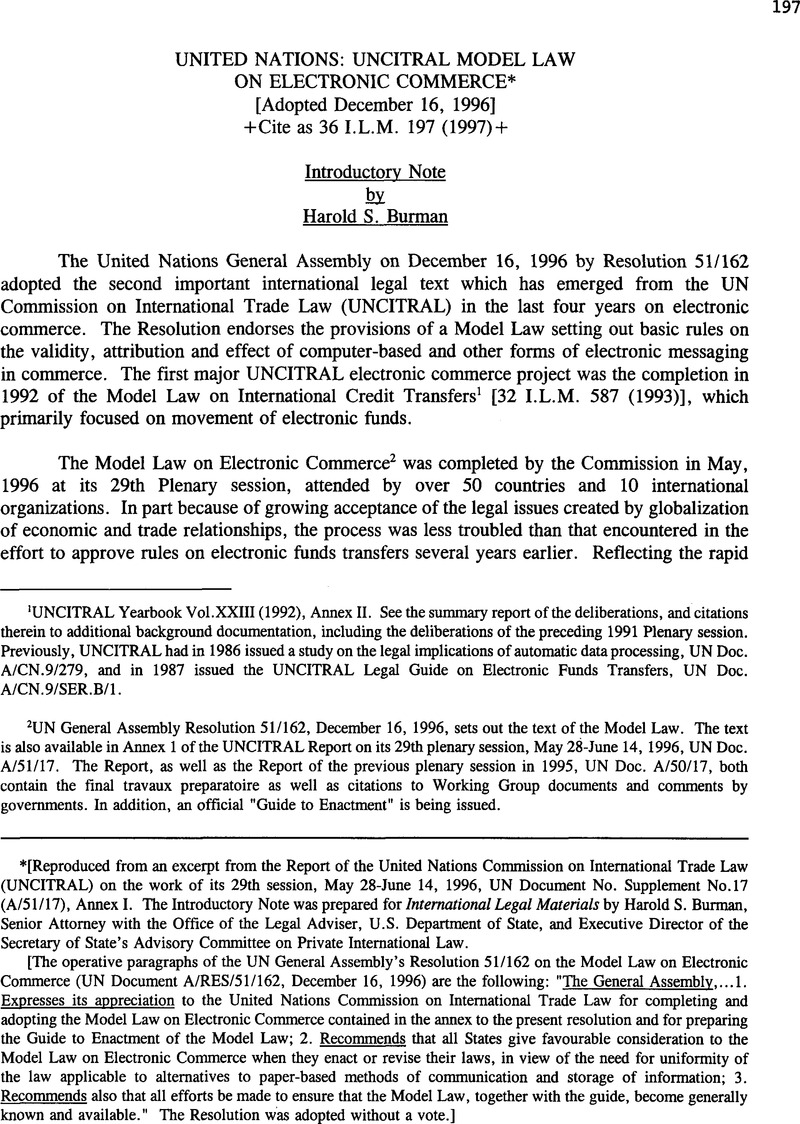No CrossRef data available.
Article contents
United Nations: Uncitral Model Law on Electronic Commerce
Published online by Cambridge University Press: 27 February 2017
Abstract

- Type
- Legislation and regulations
- Information
- Copyright
- Copyright © American Society of International Law 1997
References
* [Reproduced from an excerpt from the Report of the United Nations Commission on International Trade Law (UNCITRAL) on the work of its 29th session, May 28-June 14, 1996, UN Document No. Supplement No. 17 (A/51/17), Annex I. The Introductory Note was prepared for International Legal Materials by Harold S. Burman, Senior Attorney with the Office of the Legal Adviser, U.S. Department of State, and Executive Director of the Secretary of State's Advisory Committee on Private International Law.
[The operative paragraphs of the UN General Assembly's Resolution 51/162 on the Model Law on Electronic Commerce (UN Document A/RES/51/162, December 16, 1996) are the following: “The General Assembly…. 1. Expresses its appreciation to the United Nations Commission on International Trade Law for completing and adopting the Model Law on Electronic Commerce contained in the annex to the present resolution and for preparing the Guide to Enactment of the Model Law; 2. Recommends that all States give favourable consideration to the Model Law on Electronic Commerce when they enact or revise their laws, in view of the need for uniformity of the law applicable to alternatives to paper-based methods of communication and storage of information; 3. Recommends also that all efforts be made to ensure that the Model Law, together with the guide, become generally known and available.” The Resolution was adopted without a vote.]
1 Uncitral Yearbook Vol.XXIII (1992), Annex II. See the summary report of the deliberations, and citations therein to additional background documentation, including the deliberations of the preceding 1991 Plenary session. Previously, Uncitral had in 1986 issued a study on the legal implications of automatic data processing, UN Doc. A/CN.9/279, and in 1987 issued the Uncitral Legal Guide on Electronic Funds Transfers, UN Doc. A/CN.9/SER.B/1.
2 UN General Assembly Resolution 51/162, December 16, 1996, sets out the text of the Model Law. The text is also available in Annex 1 of the Uncitral Report on its 29th plenary session, May 28-June 14, 1996, UN Doc. A/51/17. The Report, as well as the Report of the previous plenary session in 1995, UN Doc. A/50/17, both contain the final travaux preparatoire as well as citations to Working Group documents and comments by governments. In addition, an official “Guide to Enactment” is being issued.
3 The Unece's Working Party (WP.4) on trade facilitation has taken the lead on creating an international computer language for commercial messaging, known as Unedifact. While in the United States most pre-structured commercial messages adopt the computer language created by the American National Standards Institute (ANSI), this may migrate in the future to the Unedifact system. WP.4 also produced an important model Trading Partner Agreement, designed to provide an agreed legal framework for the use of computer messages, as well as their legal effects, between commercial parties.
4 The ICC is active in several electronic commerce areas, including preparation of “E-Terms”, along the lines of the ICC's Incoterms; as well as standards for proposed cybernotaries, digital signatures and other aspects of the legal infrastructure for electronic commerce. The American Bar Association's Sections on Science and Technology and Business Law are also actively engaged in this process.
5 UCC Article 4A has been adopted without change by most jurisdictions in the United States, in part a tribute to the recognition of the disruptions that would occur to electronic commerce in the banking industry without such harmonization. The new proposed UCC Article 2A has made clear how far the use of computer technologies have blurred the once distinct fields of copyright law and contract law. Partly however because these issues are so new, the ability of law development bodies to successfully formulate legal standards at this stage is still in question, although a uniform law could emerge by 1998.
6 The apparent economic advantages in cost reduction and opening of new markets (which can facilitate trade for developing and emerging states as well) have led to more efforts to construct international legal norms in this area. Both Unidroit and Uncitral, for example, are engaged in drafting a new convention on international secured interests and accounts receivable. The U.S. view, shared by almost all international lending agencies, is that for such conventions to be effective in the 21st century, they must be based on some form of internationally-linked electronic registries of commercial interests. In addition, Uncitral is examining whether to now take up internationally the preparation of rules on “digital signatures”, and the possible relationship to the recently emerging concept of “certifying authorities”, i.e., third-party service providers who electronically stand behind the purported remote originator of a computer message. See the recent Secretariat Note “Planning of Future Work on Electronic Commerce: Digital Signatures, Certification Authorities and related legal issues”, UN Doc. A/CN.9/WP.71, December 31, 1996.


